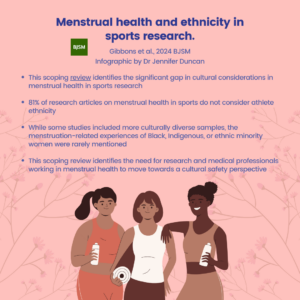Keywords: Menstruation, Female Athletes, Sports, Indigenous Methodology
Sports and medical professionals are increasingly focused on menstrual health and how it affects sporting performances, health, and well-being. However, with few exceptions, much of this research has focused on athletes of Caucasian and European descent, with findings generalized to athletes from distinct cultural and ethnic backgrounds. Very little research has considered how athletes’ ethnicity may shape their experiences of menstrual health in sports, or how medical providers consider ethnicity in supporting and treating athletes.
A scoping review of 1089 articles recently published in the British Journal of Sports Medicine identifies the significant gap in cultural considerations in menstrual health in sports research (1). The careful consideration of the inclusion of ethnicity in future research is important to help coaches, medical personnel, and support staff approach this topic effectively without causing or exacerbating harm.
Why is this study important?
This study is important because it acknowledges how women’s cultural and ethnic identities significantly influence women’s experiences of menstruation in sports. It also identifies the need for new approaches that prioritize cultural safety in research and medical practice.
How did the study go about this?
For this study, we adapted criteria from Indigenous health researchers to produce an 11-item criteria to assess the quality of sports medicine research including participants of non-white ethnicities. An electronic database search identified 1089 articles related to menstrual health and sports, with 55 meeting the inclusion criteria. We then used the Inclusion of Participant Ethnicity Quality Assessment Criteria to review nine articles, with each given a rating of ‘poor’ (below 7 points), ‘fair’ (8-15 points), or ‘good’ (16-22 points) in how ethnicity was considered throughout the research design, findings and conclusion.
What did the study find?
This scoping review examined how ethnicity is considered in sports science and medicine research on menstrual health in sports and identifies important gaps. The study found that 81% of research articles on menstrual health in sports do not consider athlete ethnicity.
Of the nine studies that met the final inclusion criteria, five studies were assessed as poor (0 – 7 points), three as fair (8 – 15 points), and two as good (16 – 22 points) in how ethnicity was considered in the research design, findings and conclusion.
While some studies included more culturally diverse samples, very rarely were the menstruation-related experiences of Black, Indigenous, or ethnic minority women the focus of nuanced consideration. The invisibility of data or skewed results on ethnicity could cause harm to sportswomen due to the results being generalized, the cultural differences being denied, and medical care not respecting women’s culturally specific knowledge of health, well-being, and menstruation.
What are the key take-home points?
This scoping review identifies the need for research and medical professionals working in menstrual health to move towards a cultural safety perspective. Future research should not simply ‘add’ more cultural diversity into samples and then ‘stir’, rather researchers need to rethink their methodologies in ways that genuinely respect and value the cultural diversity of experiences of menstrual health. Research on menstrual health in sports needs to work towards cultural safety and cultural responsiveness. It is only then that menstrual health in sports research can move towards ‘excellence’ in terms of how athletes’ cultural and ethnic backgrounds are considered in the research designs.
With greater knowledge and consideration of how women from different cultures and ethnicities understand menstruation, medical and sports professionals can better support the menstrual health and well-being of their athletes, which has the potential to positively impact their training and performance, as well as overall feelings of belonging and support in their sporting environments.

References:
- Gibbons AE, Pedlar C, Varner Hemi K, et alMoving from ethnic exclusions to cultural safety: how is athlete ethnicity discussed in research on menstrual health in sports? A scoping review British Journal of Sports Medicine 2024;58:435-443.
Author and Affiliations:
Agatha Elizabeth Gibbons, Charles Pedlar, Keakaokawai Varner Hemi, Georgie Bruinvels, Bruce Hamilton, and Holly Thorpe